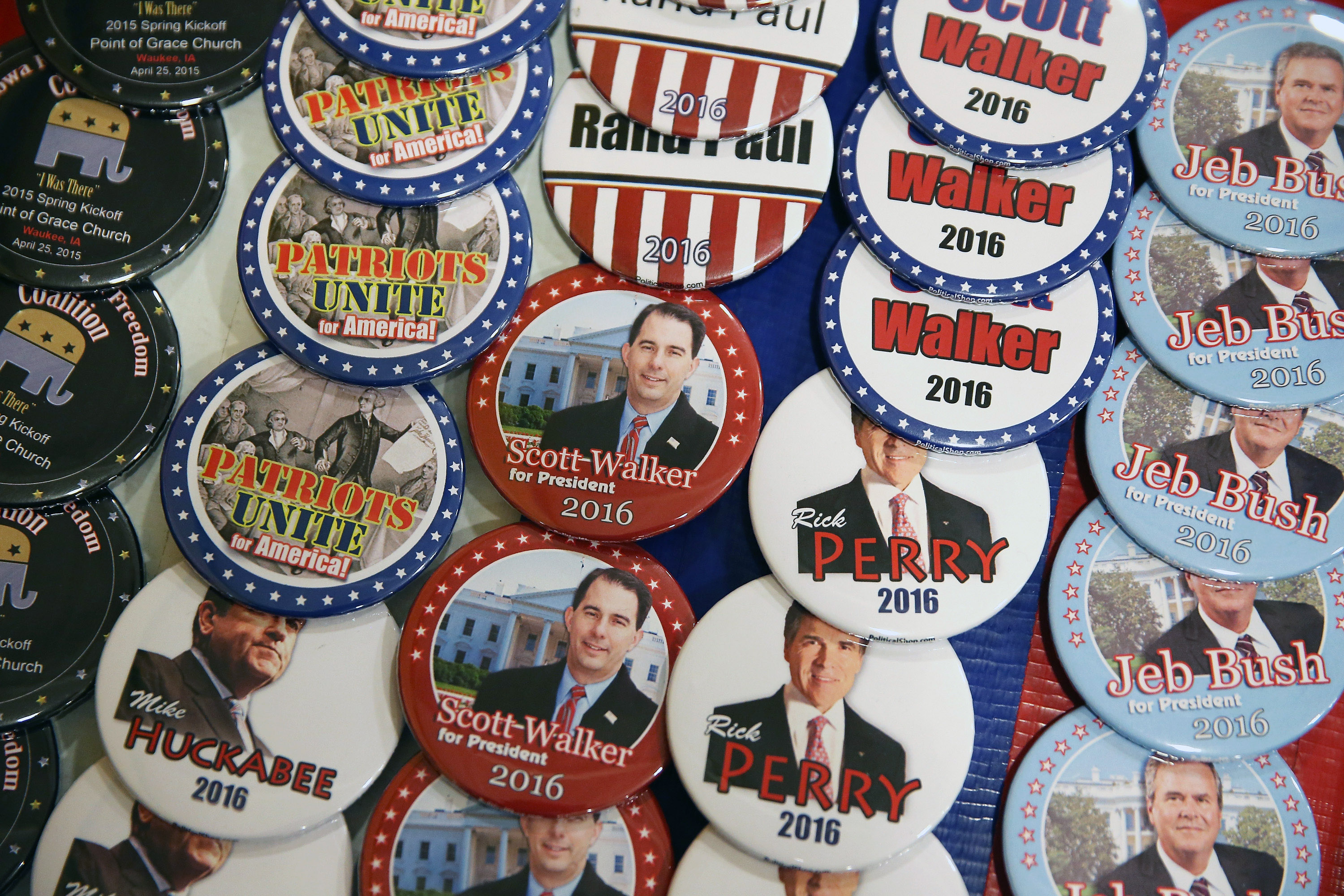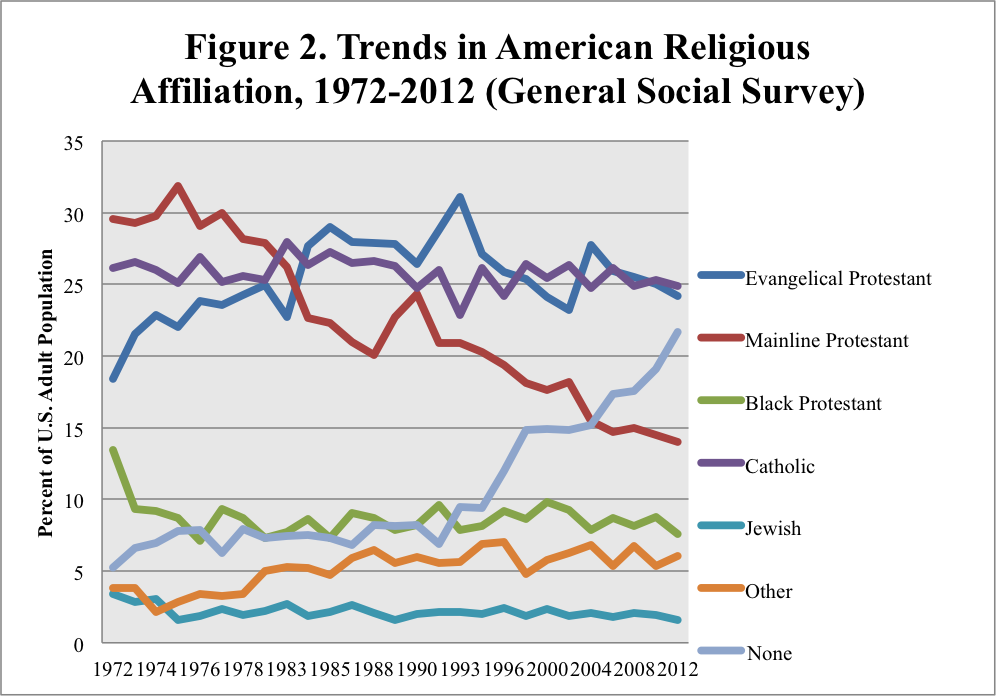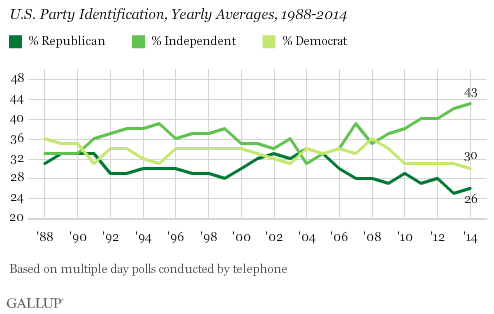In the Trump era, Republicans can learn a thing or two from the decline of mainline Protestants
When having the money and the power just isn't enough...


A free daily email with the biggest news stories of the day – and the best features from TheWeek.com
You are now subscribed
Your newsletter sign-up was successful
Jeb Bush is suffering from the soft bigotry of high expectations. A former two-term governor of Florida, Bush has the most money of anyone in the presidential race, an admirable résumé, solid support among the Republican establishment, a reputation as the "smart Bush son," and dynastic name recognition. It is all the more embarrassing, then, that a boorish real estate mogul is eating his lunch in the polls.
Bush isn't alone. Jeb is trailing Donald Trump by double digits in RealClearPolitics' average of national polls, but in the first poll since the first official GOP debate last Thursday, from NBC News, he doesn't even make the top five. At 7 percent support among Republican primary voters, Bush trails not just Trump (23 percent), but also Sen. Ted Cruz, neurosurgeon Ben Carson, former Hewlett-Packard CEO Carly Fiorina, and Sen. Marco Rubio.
The only one of those candidates who might be considered part of the powerful Republican establishment is Rubio. And that's been the dynamic of the 2016 Republican primary so far: The GOP establishment has the power, the money, and the name recognition, but not the numbers or the fervor.
The Week
Escape your echo chamber. Get the facts behind the news, plus analysis from multiple perspectives.

Sign up for The Week's Free Newsletters
From our morning news briefing to a weekly Good News Newsletter, get the best of The Week delivered directly to your inbox.
From our morning news briefing to a weekly Good News Newsletter, get the best of The Week delivered directly to your inbox.
If the Republican Party were Christianity, the establishment would be the mainline Protestants and the Tea Party faction — for lack of a better label — would be the evangelical denominations: Southern Baptists, Pentecostals, and especially the various single-brand mega-churches. That's not a great place for establishment Republicans to be.
The most in-depth recent survey of religion in America was released by the Pew Research Center this spring, and while the report was discouraging for Christianity in general, it was especially glum for mainline Protestants, whose share of the U.S. religious pie shrank 4.3 percent, or by about five million congregants, between 2007 and 2014. The evangelical share also shrank, by 0.9 percent, but in terms of actual numbers, their ranks likely grew.
The parallels between the Republican establishment and America's mainline Protestant churches are pretty striking. Let's start with demography: The median age of mainline Protestants is 52, three years older than that of evangelicals and 16 years older than that of the religiously unaffiliated, according to Pew. According to General Social Survey data, the average age of strongly partisan Republicans in 2012 and 2010 was 52.3. In 2014, 86 percent of mainline Protestants were white, Pew found. Republicans, according to Gallup, are 89 percent white.
Then there's outsized power. Despite challenges from various flavors of insurgents, Mitt Romney won the Republican nomination in 2012, as did John McCain in 2008. In a more recent example of the GOP establishment's muscle, there's a good chance the GOP-controlled House will follow the Republican-led Senate and revive the U.S. Export-Import Bank — a cause championed by the Chamber of Commerce and other big business interests but strongly opposed by the Koch brothers' Americans for Prosperity and Tea Party flagship group FreedomWorks.
A free daily email with the biggest news stories of the day – and the best features from TheWeek.com
Mainline protestant denominations also have power disproportionate to their numbers. And that power comes largely from the socio-economic and political clout of their members. In the 114th Congress, for example, about 150 of the 535 members are Methodist, Episcopalian, Presbyterian, and Lutheran, making up 27.8 percent of the federal legislature; the same denominations make up just 16 percent of the U.S. adult population. Meanwhile, 14.8 percent of Congress is Baptist, versus 17 percent of the adult population.
Bill Clinton is a Southern Baptist, but George W. Bush is a Methodist, George H.W. Bush is Episcopalian, and Ronald Reagan was a Presbyterian. (President Obama has attended several Protestant churches.)
Financially, mainline Protestants earn about twice as much as evangelical Protestants, according to to Ohio State University sociologist Lisa Keister. Pew has this chart:
[[{"type":"media","view_mode":"media_large","fid":"125774","attributes":{"alt":"","class":"media-image","height":"649","style":"display: block; margin-left: auto; margin-right: auto;","typeof":"foaf:Image","width":"600"}}]][Pew]
Wealthier congregants make for fatter church coffers. And while there's also plenty of tithing and other (tax-free) money pouring into evangelical churches, with the possible exception of the Southern Baptists, none of them can hold a candle to the massive, prime real estate holdings of the Episcopalians, Presbyterians, United Methodists, and Evangelical Lutherans.
On the political side, the money issue has become more complicated with the advent of deep-pocketed super PACs and wealthy individual donors (and candidates, like Trump and Romney). But establishment darling Jeb Bush has far outraised any of his rivals in the money race this election cycle, and in most national races, how much money the Republican National Committee commits can easily determine a candidate's fate on Election Day. And along with the money, the RNC and other party apparatuses have well-oiled, hierarchical organizations in place — as do the established mainline Protestant churches.
Not all the parallels between the GOP and Protestant establishments are ones either side would embrace, of course. If mainline Protestants are seeing the sharpest decline in U.S. congregations, the steepest growth has been among the religiously unaffiliated, as this chart from the Council on Contemporary Families makes clear. Pay particular attention to the red line (mainline Protestants) and the light purple one ("Nones"):

[Council on Contemporary Familes]
That's also true in American politics, as shown in this Gallup chart of political affiliations:

[Gallup]
For the mainline Protestants, the growth of the "nones" raises the specter of ever-emptier pews. For Republicans, many independents will still vote — many of them in the Republican primaries — they just may not vote the way the establishment might wish.
So there's one explanation for Trump's success, and Jeb Bush's weak launch. If Bush is the embodiment of the establishment Republican — joined by fellow poll-laggards Chris Christie, Rubio, probably Scott Walker, and, despite his pretensions otherwise, Rick Perry — Donald Trump, properly understood, isn't even a Republican. For the sake of argument, let's call him a Republican-leaning independent, but he pretty openly pledges allegiance to the Trump Party.
In fact, part of Trump's appeal is that he is openly cynical and mocking of "stupid" national politicians and can plausibly say he has no experience in Washington. Carson and Fiorina, both political neophytes, can say the same thing.
The reason Trump can insult a war hero like John McCain and then rise in the GOP polls, suggests the BBC's Anthony Zurcher, is that McCain "embodies a Republican Party Washington elite that is hemorrhaging support even among the conservative faithful." Only 68 percent of Republicans are happy with their party, he adds, citing recent Pew data.
In other words, money and organization and power are great assets, but when it comes to a democracy, they may not be enough. And for the GOP establishment, they may not be enough this go-around. Can they learn anything from the mainline Protestants? Maybe.
First, both need new adherents. If you want to have a bigger party, you need a bigger tent. Protestant churches are making a concerted effort to attract younger adherents, both young families and singles, through outreach and a shift in messaging. All major Christian groups — Catholic, evangelical, and mainline Protestant — gained Latino members, even as they lost white congregants to death or disaffiliation.
The thing is, Republicans already know all this — you can see it, written down, in the post-2012 RNC "autopsy." When it comes to the youth vote, for example, the Republican National Committee noted: "On messaging, we must change our tone — especially on certain social issues that are turning off young voters. In every session with young voters, social issues were at the forefront of the discussion; many see them as the civil rights issues of our time. We must be a party that is welcoming and inclusive for all voters."
On Latinos: "If Hispanic Americans hear that the GOP doesn't want them in the United States, they won't pay attention to our next sentence."
The Republican presidential candidates, with a few exceptions, don't seem to have taken much heed, but you can't really blame them: The Republican voters who answer pollsters' calls and attend debates don't seem to have, either. If the RNC can't control the party's messaging, that's a bad sign for Republican establishment.
Republicans may not want to look toward religion for their salvation, of course: The Protestant churches haven't figured out how to save themselves. And the RNC, Jeb Bush, and other establishment figures have an advantage over their mainline Protestant brethren: It's harder to get someone to come to church each Sunday than to cast a ballot every couple years. But that also means the GOP establishment only gets one or two real shots to win in the unpredictable age of Trump.
Peter has worked as a news and culture writer and editor at The Week since the site's launch in 2008. He covers politics, world affairs, religion and cultural currents. His journalism career began as a copy editor at a financial newswire and has included editorial positions at The New York Times Magazine, Facts on File, and Oregon State University.
